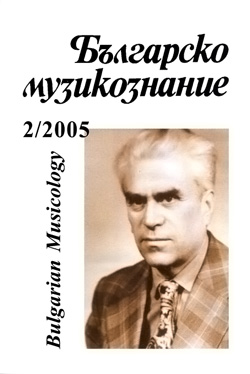Монодията и композиторските интенции днес. Менящите се исторически оценки
Monody and Composer’s Intentions Today. Chanching Historical Appraisals
Author(s): Dimiter ChristoffSubject(s): Music
Published by: Институт за изследване на изкуствата, Българска академия на науките
Summary/Abstract: Today it might be possible to take the risk of looking for another definition of the phenomenon monody and it is as follows: a rationalized sound proceeding, with unidirection in the concept being built up. The radical act of re-defining music in the 1960s should be recalled, which from an art of tones became an art of sound (also including the noise along with the tones or even before them), which turns the search for the beginnings of music far backwards to the pre-history of man, even before him, searching for them as a human activity that precedes man himself. In 21 century the musician had another feeling, he could already hear the individual single singing in another way, differentiating in the single construction multidirectional characteristics e.g. he would hear in it the changing timbre simultaneously with the changing tone pitch, the changing rhythmic sequences together with the changing timbre and tone pitch, he would comprehend them in one time dimension – this comes from today’s notions of richness of simultaneously proceeding voices – thus the individual single singing suddenly includes simultaneously realized parallelly proceeding characteristics in their otherwise single melodic process. And exactly during the second half of 20 century, another way was shaped, the way of monody used as objective material, a new concept that became the start of a new composers’ technique and has the significance of a radical novelty. The material provides only the idea and it is pretransposed to the individual needs, not to the material itself. Therefore, we have started talking about equalizing the experience of Bulgarian composers with that of Western Europe, which occurred in the 70s, because the Bulgarian composer started solving problems on the level of the world seeking thought, he already solves them in an individual style, not by means of national identifying peculiarities, attempting to legitimize him as original through a common banal technique and its further trimming by national monodic manifestations. It is not accidental that the method of objective material was preconditioned by the new folklore wave in Eastern Europe in the 60s of 20 century. Nowadays a view is being formed that 20 century was a period of individual styles, like a parade of individual perceptions on a technological scale, which equalize Schoenberg with Stavinski (do not oppose them to each other), Webern with Hindemit and Prokofiev, aleatory with Shostakovich, etc. The significance of XX century lies in the equal display of the experienced, occurring through Schoenberg as well as through Stravinski, and Webern, and Hindemit, and Prokofiev, etc.
Journal: Българско музикознание
- Issue Year: 2005
- Issue No: 2
- Page Range: 71-85
- Page Count: 15
- Language: Bulgarian
- Content File-PDF

